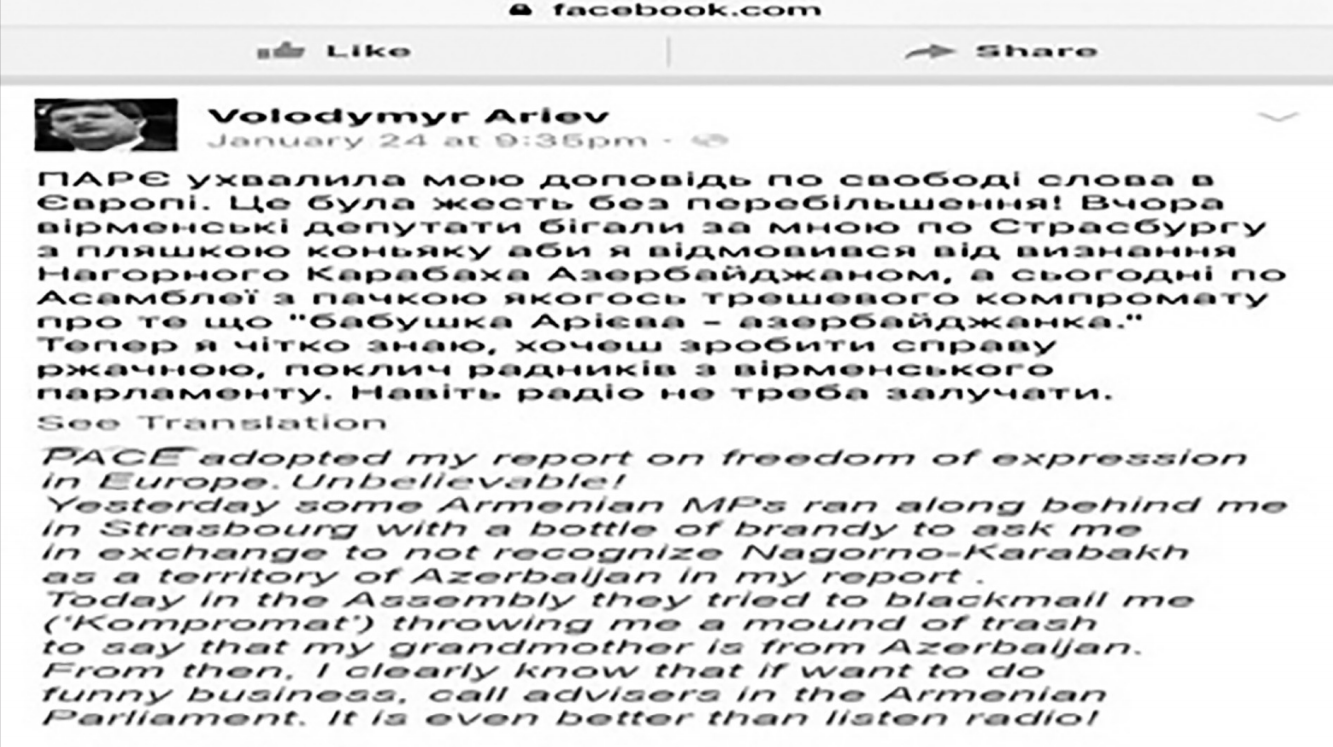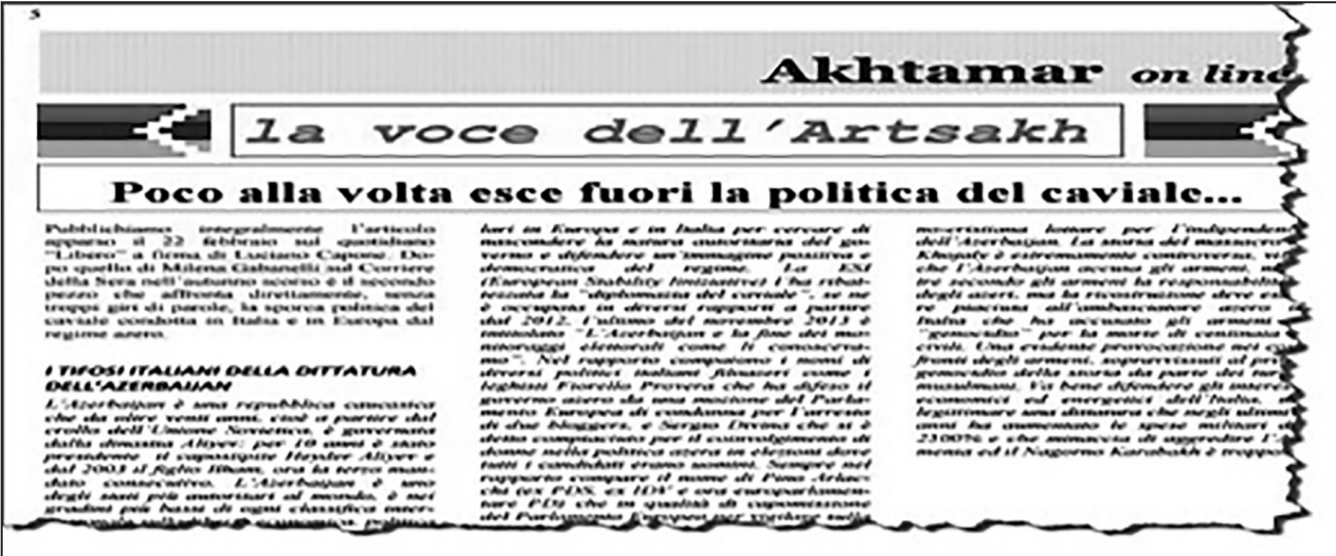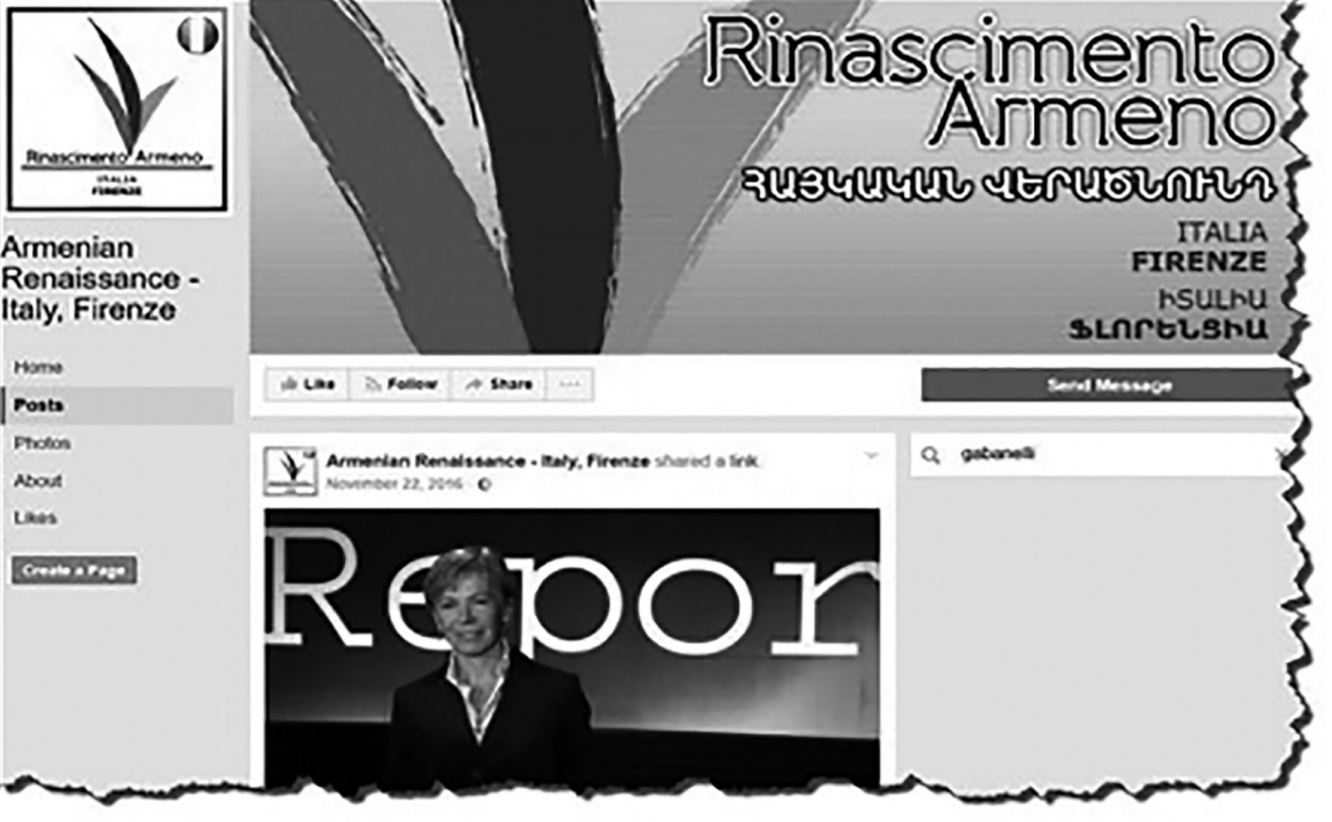On 24 January 2017, Ukrainian MP Volodymyr Ariev, a rapporteur of the PACE’s media freedom report. entitled “Attacks against journalists and. media freedom in Europe”, in a post on his Facebook page said 1hat over recent years, some MPs have been using the Parliamentary.Assambly of theCouncil of Europe for personal interests without taking heed of the truth.
Simultaneously. Volodymyr Ariev shed light on the activities of three Armenian PACB members – MPs Samuel Farmanyan, Naira Karapetyan and Nalra Zohrabyan.They all egedly attempted to bribe Ariev in order to persuade the Ukrainian parliamentarian to make changes to his report on the media freedom and respect for lnternational law. As was stated publicly, the Armenian MPs’ attempts to bribe the parliamentarian were meant to have all mentions on the occupation of the.Azerbaijan’s NagornoKarabakh territories removed from Ariev’s report However, Ariev said the three MPs tried to bribe him with a 40-year-old bottle of vintage Armenian cognac worth around 1,400 euros.

The European Strategic Intelligence and Security Centre (ESISC) investigated this information and presented a report on the outcome of the study on 6 March 2017. The report said: “Ariev’s refusal to succumb to the demands of the Armenians resulted in a violent pressure and a libel campaign. The members of the Armenian delegation, including members from Ariev’s political party, spearheaded these attacks throughout the 2017 winter parliamentary session.”
The most dangerous claim was that “Ariev’s grandmother is an Azeri woman”, alluding that he also might be an ethnic Azeri man. ESISC report revealed that the most concerning aspect is that the Ariev case is just the tip of the iceberg of an even more worrying and systemic problem, and is an outright proof of an organized network of several MPs on behest of Armenia and in violation of the international laws.
Thus, the investigation brought to light that a group of PACE members conspired with Armenia and the Armenian diaspora organizations in Europe and set up a broad and deep-rooted bribing network in PACE to organize the European Stability Initiative’s pressure campaigns against Azerbaijan.
In the report, the year of 2012 was regarded as the crucial year when “Armenian connection” began to expand its roots in the Council of Europe. The report showed that in 2012, Christoph Strasser built relations with Gerald Knaus, head of the European Stability Initiative, known as “think tank” of the George Soros Foundation. It was emphasized that several other NGOs, financed by Soros and disguised under non-commercial activities, actually influenced the Council of Europe and served the interests of Armenia.
The ESISC report revealed that in 2012, certain individuals came together and got quickly involved in playing an important role in political manoeuvers aimed at discrediting the Republic of Azerbaijan. It was noted that Christoph Strasser, as a member of the German Socialist Party, joined the Parliamentary Assembly of the Council of Europe in 2006, and in 2012, he met with Gerald Knaus, the mastermind of the conspiracy against Azerbaijan. Gerald Knaus is an Austrian-born economist, who founded the European Stability Foundation (ESI) in Berlin in 1999. The ESI is one of the multiple think tanks associated with the George Soros’ Open Society Foundations.
Knaus is a well-known in the network of NGOs funded by the American billionaire George Soros. He was suspected of attempts to destabilize stability in certain eastern European states, formerly socialist bloc countries. This provides conditions for the ESI and other NGOs to introduce themselves as civil society supporters that allegedly defend just causes but instead act as lobby groups on behest of George Soros, insuring the control of the Council of Europe and advocating interests of the Republic of Armenia.
The ESISC said that according to ONG Monitor, an organization specialized in the analysis of transparency and good-governance of NGOs, the Soros Foundations has an endowment of 4 billion euros and contributes to the funding of over 50 European NGOs, including Human Rights Watch, Amnesty International, Human Rights House Foundation, Open Dialogue, European Stability Initiative, and Helsinki Committee for Human Rights.
Underscoring that each of the Soros-funded organization has transparency problem, the ESISC experts emphasized that regardless of slogans of Georgia’s Rose Revolution, or Ukraine’s Orange Revolution, during those events the focus should be put on the role played by the network of NGOs and think tanks under Soros’ Open Society Foundations.
The document claimed that the United States, under President Obama’s administration, allegedly used the Ukrainian popular revolution to organize a coup to set Ukraine against Russia. Referring to other leaked documents, it was noted that George Soros personally played a pivotal role in the Ukrainian politics and that he benefited from privileged relations with President Obama’s higher cabinets as well as with European national and international institutions.
The transcript of a phone conversation between Victoria Nuland, former Assistant Secretary of State for European and Eurasian Affairs, and Ambassador to Ukraine Geoffrey Pyatt, clearly substantiated the theory of a Washington-led coup in Ukraine. The ESISC report noted:
“As for George Soros, documents released by the French web-site Mediapart confirmed Soros’ significance and the role for advising officials in Ukraine’s highest power echelons on taking economic, financial and defense-related decisions and even advised the Ukrainian armed forces to undergo training by U.S. instructors in the NATO-member country of Romania.”
We should note that this “private diplomacy”by George Soros is forbidden by the Logan Act. The Logan Act is a United States federal law that criminalizes negotiation by unauthorized per sons with foreign governments having a dispute with the United States. The intent behind the Act is to prevent unauthorized negotiations from undermining the government’s position. However, George Soros takes no heed of the requirements of this law and believes he is above the law.
Multiple NGOs played an important role in the Ukrainian crisis. Many of them, including those funded by the Open Society Foundations, participated in the Ukrainian popular uprising. However, it was not ruled out that George Soros put pressure on Ukraine. For dozens of years, his network of NGOs and think tanks has spearheaded a campaign of libel and slander against Azerbaijan, attempting to describe one of the most stable and secular Caucasus nation Azerbaijan on the border of Iran as an autocratic and corrupt dictatorship.
The NGOs circulated information about a new wave of political arrests, but turned a blind eye to the criminal offences committed by convicts. As an example, it should be noted that this information did not mention that among those arrested were many people who fought in Iraq and Syria in the ranks of the illegal armed formations.
This is an obvious proof of disinformation. Thus, contrary to steps taken by European democracies on similar issues, they intend to discredit the Azerbaijani government despite perfect legal and justified measures to fight the problem within its borders.
We should note that Soros does not only interfere in the backyard of European continent. He is still active in the United States where he uses his philanthropic network to conduct an intense pro-Armenian strategy. To this effect, he made the Open Society Institutes’ (OSI) Yerevan branch a key element to the Armenian diplomacy.
Simultaneously, Soros relies on the powerful American Armenian lobby to reinforce his strategy to “play with Armenia in order to destabilize Azerbaijan”.
On 25 January 2001, Azerbaijan and Armenia both became members of the Council of Europe, holding out hope that a common loyalty to the European ideals would incentivize construcive dialogue between both states. Unfortunately, on the contrary, Azerbaijan has become the target of unjustified and continuous attacks.
Gerald Knaus, the president of the European Stability Initiative and a member of the board of the Soros Foundation, instigated hostilities towards Azerbaijan by describing it as a corrupt country, without, however, backing up these accusations with proofs.
Using all available resources to try to destabilize stability in Azerbaijan, Gerald Knaus attacked the reputation of the Azerbaijani Republic and managed to achieve his purpose.
In 2012, when an anti-Azerbaijan network started shaping inside the Parliamentary Assembly of the Council of Europe, the European Stability Initiative published a slanderous and particularly damning report, entitled “Caviar Diplomacy”.
This report, based on slander, backed by a climate of suspicion was deprived of any objective apart from providing conditions for the formation of a network of MPs engaged in a political war against Azerbaijan. To act efficiently within the Council of Europe, the man of the Georges Soros Foundation needed to infiltrate faithful partners in the Parliamentary Assembly.
While it was easy for him to gain unconditional support of the Armenian MPs, he needed the help and loyalty of MPs from other countries and preferably representatives from European Union member states. This task was successfully achieved when Christoph Strasser and several PACE members joined the anti Azerbaijani project.
Christoph Strasser, a close friend of Knaus, was until February Commissioner for Human Rights and Humanitarian Aid under the Federal Republic of Germany. He resigned from the post when an investigation was launched by the Christian Democratic Union of Germany (CDU).
We should note that after the report “Follow-up to the issue of political prisoners in Azerbaijan”, prepared by Strasser, was rejected during the Assembly’s 2013 January session, he began to collaborate with the Italian journalist Milena Gabanelli in order to attack the Republic of Azerbaijan.
In November 2016, Gabanelli, a renowned Italian journalist in charge of Italian public Television channel RAI 3 backed by the country’s political leftists, aired a scandalous and deceptive program that openly defended interests of Armenia and attacked Council of Europe MPs. This left-leaning woman is both a successful TV-anchor and a realist manager as she was shocked and perplexed by the fact that George Soros through his foundation supported her program. One of the aspects of worth attention is that in 2013 Milena Gabanelli was a member of the jury of the Tiziano Terziani literary contest in Italy, where Georges Soros won for his book “Financial Turmoil in Europe and in the United States”.
It is also important to underscore that Gabanelli is an “old friend” of Armenia. During the war in Nagorno Karabakh, she was a media correspondent on the Armenian side and since then she has always backed official Yerevan without expressing her concern about the fate of the Azerbaijani refugees or the illegality of the Armenian occupation without taking into consideratian the debatable level of democracy in Armenia. Her display of unilateral commitment made her nearly a star of the Armenian media.


As for Christoph Strasser, along with doing favor with Gabanelli, he appeared in a program of Samuel Farmanyan, one of the Armenian MPs that tried to bribe the Ukrainian MP Volodymyr Ariev. This intimacy is highly suspicious and reveals the extent of Christoph Strasser’s impartiality.
In the context of what was said above, the activities of Dutch MP Pieter Omtzigt from the European People’s Party and a PACE member since 2010 draw attention. During the first two years of his mandate, Omtzigt repeatedly expressed his concern about the political situation in Armenia. However, out of sudden, in 2012, Omtzigt made a complete U-turn and started targeting Azerbaijan. He unexpectedly decided to “get interested” in the human rights situation in Azerbaijan. This change was in no way connected with changes in Azerbaijan’s politics.
ESISC experts consider that the sudden change in the position of Pieter Omtzigt towards the Azerbaijani Republic coincided with the 2012 legislative elections in the Netherlands. His political party lost the elections in that year. However, Pieter Omtzigt run an impressive election campaign and was surprisingly elected to the parliament with a big majority (36,750 votes).
Later, Omtzigt went on with his baseless and unjust attacks on the Republic of Azerbaijan from PACE. Later Pieter Omtzigt made no effort to hide his relations with Gerald Knaus’ European Stability Initiative and collaborated with him in the drafting the second part of the report, titled “Caviar Diplomacy”. He was assisted by Frank Schwabe in this biased and scandalous attack against the Republic of Azerbaijan.
Frank Schwabe joined the Parliamentary Assembly of the Council of Europe in 2011. Since then, he has aligned his political views with his colleague Christoph Strasser in order to find support in climbing the career ladder of the Social-Democrat Party (SPD), the German socialists. This strategy made him a perfect recruit of the anti-Azerbaijani network.
Strasser and Schwabe have been the leading actors of the campaign in the Social-Democrat Party in spearheading the recognition of the 1915 fabricated genocide of Armenians. Schwabe does not hide his purposeful biased position against Azerbaijan.
Rene Rouquet, the president of the French-Armenia socialist parliamentary friendship group, and the centrist Franҫois Rochebloine, who supports the interests of the France-Karabakh Friendship Circle, are active members of the anti-Azerbaijan campaign. Rochebloine has repeatedly organized illegal visits to Armenia-occupied Nagorno-Karabakh region of Azerbaijan, and hereby, showed disrespect for the internationally-recognized territorial integrity and the state sovereignty of Azerbaijan.
Rene Rouquet, the former head of the French delegation to PACE and PACE’s Vice-President, has always been biased and hostile against Azerbaijan. In 2010, without consent of the Azerbaijani government, Rene Rouquet and several other French MPs visited Nagorno-Karabakh occupied by Armenia and met with the “leadership” of the separatist regime. The Azerbaijani authorities declared Rene Rouquet a persona non grata and banned his entrance into the country.
During the debates on the report “Functioning of democratic institutions in Azerbaijan”, drafted by Andres Herkel and Joseph Debono Grech, co-rapporteurs of the Monitoring Committee on Azerbaijan, Rene Rouquet maliciously criticized Azerbaijan, as well as justified the trip of several French parliamentarians to Nagorno-Karabakh, and condemned the response of the Azerbaijani government to this issue.
In October 2011, 32 PACE members made a joint statement on the recognition of the separatist formation of “Nagorno-Karabakh republic” as an independent state created in the occupied territories of Azerbaijan. Rene Rouquet was among the signatories of this document.
During the PACE’s summer session in 2016, Rene Rouquet put forward an anti-Azerbaijani proposal on behalf of the French delegation regarding the April escalation of tension on contact line of troops and the ensuing clashes.
I should note that Rene Rouquet was not issued a visa to travel to Azerbaijan in order to attend the meetings of the PACE Bureau and the Standing Committee held in Baku on 22-23 May 2014. On 22 May, the Bureau debated the issue of the visa rejection to Rene Rouquet due to his illegal trip to the occupied territories of Azerbaijan, and decided not to hold the committees’ meetings scheduled for two years in Azerbaijan.
Thus, the brief analysis proves that since 2012, there has been a secret network within the Council of Europe that was mobilized against Azerbaijan. The tactic of the network has been to multiply slanderous attacks and smear campaign directed at destabilizing Azerbaijan by putting pressure on it under different pretexts with the end goal of dissimulating the illegal occupation of the Nagorno-Karabakh region by the Republic of Armenia.
This network incorporates numerous parliamentarians and international NGOs and is financed by the Open Society Organizations. The dangerous policy pursued by this network cast a doubt on the credibility and principles of PACE.
